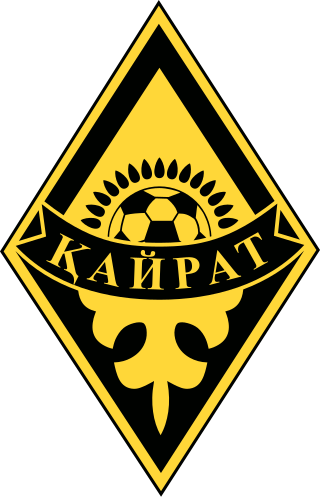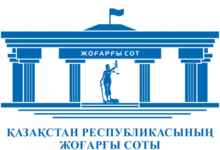
The Judiciary of Russia interprets and applies the law of Russia. It is defined under the Constitution and law with a hierarchical structure with the Constitutional Court and Supreme Court at the apex. The district courts are the primary criminal trial courts, and the regional courts are the primary appellate courts. The judiciary is governed by the All-Russian Congress of Judges and its Council of Judges, and its management is aided by the Judicial Department of the Supreme Court, the Judicial Qualification Collegia, and the Ministry of Justice, and the various courts' chairpersons. And although there are many officers of the court, including jurors, the Prosecutor General remains the most powerful component of the Russian judicial system.

Football Club Kairat is a professional football club based in Almaty, which plays in the Kazakhstan Premier League, the highest level of Kazakh football. Founded in 1954 as Lokomotiv Alma-Ata, they became Urozhay in 1955 and Kairat in 1956. The club's home ground is the Central Stadium which has a capacity of 23,804. The club's home kit colours are yellow and black striped shirts, black shorts and black socks.

Presidential elections were held in Kazakhstan on 4 December 2005. Incumbent president Nursultan Nazarbayev, in power since 1989, sought and won a 3rd term against four other candidates. Opposition candidates were allowed some access to the mass media, but this was still restricted. According to western election observers, opposition candidates also suffered considerable harassment. The Organization for Security and Co-operation in Europe (OSCE) criticized the elections, calling them unfair, but noted improvements.
Kayrat Kulbayev is a Kazakh music producer who rose to popularity as a jury member in SuperStar KZ 3, the Kazakh version of Pop Idol. Kayrat served as the vice president of Kazakh media firm Shahar Media Group, official partner & associate of SonyBMG in Kazakhstan, from 2003 till 2006.

Qairat Nogaibaiuly Rysqulbekov was a participant in the Jeltoqsan riot of 1986 that took place in Almaty, Kazakhstan. He later died in mysterious circumstances while held by the authorities. He was posthumously awarded the title Hero of Kazakhstan after independence.

AFC Kairat is a professional futsal club based in Almaty, the biggest city of Kazakhstan. The club was founded in 1995. Since 2012 the club has been one of the strongest teams in Europe, having reached UEFA Futsal Cup semi-finals four times and winning it in 2012–13 and 2014–15 seasons.
Khasan Iragiyevich Yandiyev was a Russian judge who served as the deputy head of the Supreme Court of Ingushetia. He presided over the trials of a number of corrupt government officials and Islamic fundamentalists and rebels in Ingushetia, one of Russia's poorest and most troubled provinces.

Visitors to Kazakhstan must obtain a visa from one of the Kazakh diplomatic missions unless they come from one of the visa exempt countries.

The Ministry of Justice of the Union of Soviet Socialist Republics (USSR), formed on 15 March 1946, was one of the most important government offices in the Soviet Union. It was formerly known as the People's Commissariat for Justice abbreviated as Наркомюст (Narkomiust). The Ministry, at the All-Union (USSR-wide) level, was established on 6 July 1923, after the signing of the Treaty on the Creation of the USSR, and was in turn based upon the People's Commissariat for Justice of the Russian Soviet Federative Socialist Republic (RSFSR) formed in 1917. The Ministry was led by the Minister of Justice, prior to 1946 a Commissar, who was nominated by the Chairman of the Council of Ministers and confirmed by the Presidium of the Supreme Soviet, and was a member of the Council of Ministers.
Musabek Turghynbekuly Alimbekov ; is a Kazakh politician who served as the fourth chairman of the supreme court of Kazakhstan.

Kayrat Abdirazaquly Mami is a Kazakh jurist and politician, former Chairman of the Senate of Kazakhstan, former twice chairman of the Supreme Court of Kazakhstan, and a former chairman of the Constitutional Council of Kazakhstan.

Kairat Nurtas is a Kazakhstan singer. He has topped the rating of the most popular local Kazakh musicians, based on CD sales

The Supreme Court of Tajikistan is the most senior body of civil, criminal, and administrative law in the Republic of Tajikistan.
Military Courts of the Republic of Kazakhstan are the specialized courts of the Armed Forces of Kazakhstan that deal with criminal cases concerning military personnel and the civilian personnel of the Ministry of Defence. The military courts are part of the judiciary of Kazakhstan. It is often noted as a common criticism that military courts generally have more connection to the government than other courts by virtue of going through the military hierarchy, which has been seen as a threat to judicial independence. Military courts consider civil cases by active servicemen or citizens who undergo military training against their will, among other things.

The Central Election Commission of the Republic of Kazakhstan is a state body in Kazakhstan, which heads the unified system of electoral commissions.

Arystanbek Muhamediuly is a Kazakh politician who served as a Minister of Culture and Sports from 11 March 2014 to 17 June 2019. He's currently the director of the National Museum of the Republic of Kazakhstan.
Qairat Qydyrbaiūly İşanov was a Kazakh politician who served as a Senator for Atyrau Region from 2005 to 2017 and was its Deputy Chair from 24 November 2011.

The Special Forces of Kazakhstan trace their history to the Soviet era spetsnaz units operating on the territory of the Kazakh Soviet Socialist Republic within the USSR. These units are the remnants of the former Soviet Army, KGB, the Ministry of Internal Affairs and GRU. Similarly to other post-Soviet states, Kazakhstan's special forces fall under the control of the Armed Forces of the Republic, the Ministry of Interior, and under the National Security Committee. Special Forces Day is officially celebrated on June 9, in honor of the signing by the President of Kazakhstan Nursultan Nazarbayev of the decision on the formation of the Coordinating Council of Special Purpose Units of State Agencies under the Security Council.

Anuar Turlybekuly "Anuarbek" Alimzhanov was a Soviet and Kazakh writer, publicist, public figure and politician. From October 29 to December 26, 1991, he headed the Soviet of Republics of the Supreme Soviet of the USSR, which adopted the Declaration on the termination of the existence of the USSR.
Kairat Boranbayev is a businessmаn, former President of Kazakhstan's National Paralympic Committee, and chairman of the supervisory board of FC Kairat.















